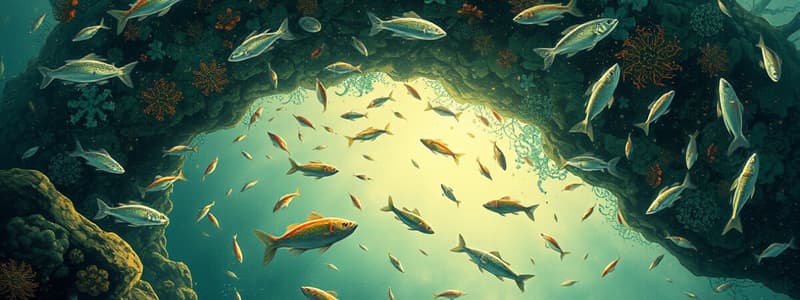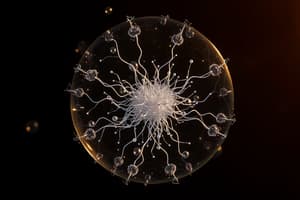Podcast
Questions and Answers
What does the Hydrothermal Vent Hypothesis propose about the origin of life?
What does the Hydrothermal Vent Hypothesis propose about the origin of life?
- Life is a result of extraterrestrial seeding.
- Life originated in deep-sea hydrothermal vents. (correct)
- Life began in freshwater lakes.
- Life developed on the surface of the Earth.
Which of the following best describes anadromous fish?
Which of the following best describes anadromous fish?
- Fish that live in freshwater and spawn in saltwater.
- Fish that spend their entire life cycle in a single habitat.
- Fish that do not migrate for breeding purposes.
- Fish that migrate to spawn in freshwater after living in the ocean. (correct)
What is a common parental care strategy among fish?
What is a common parental care strategy among fish?
- Migrating to warmer waters during breeding season.
- Avoiding territories with predators.
- Building nests for the protection of fertilized eggs. (correct)
- Consistently feeding their young after hatching.
What is the primary structure of coral reefs composed of?
What is the primary structure of coral reefs composed of?
Which hypothesis suggests that RNA was a key component in early forms of life?
Which hypothesis suggests that RNA was a key component in early forms of life?
What is a reason fish migrate?
What is a reason fish migrate?
In coral reef ecosystems, what role do zooxanthellae algae play?
In coral reef ecosystems, what role do zooxanthellae algae play?
What type of fish migrates from saltwater to freshwater to spawn?
What type of fish migrates from saltwater to freshwater to spawn?
Which of the following is NOT a common parental care strategy in fish?
Which of the following is NOT a common parental care strategy in fish?
What percentage of marine species are supported by coral reefs?
What percentage of marine species are supported by coral reefs?
Flashcards are hidden until you start studying
Study Notes
Origin Of Life Theories
- Abiogenesis: Life originated from simple organic compounds under prebiotic conditions, leading to self-replicating molecules.
- Hydrothermal Vent Hypothesis: Life may have started in deep-sea hydrothermal vents where mineral-rich waters provided the necessary chemicals.
- Panspermia: Life, or its precursors, may have been distributed throughout the universe via meteoroids or comets and eventually reached Earth.
- RNA World Hypothesis: Proposes that self-replicating ribonucleic acid (RNA) was a key component in the early forms of life, preceding DNA.
Fish Migration Patterns
- Types of Migration:
- Anadromous: Fish, like salmon, spawn in freshwater but spend most of their lives in the ocean.
- Catadromous: Fish, like eels, spawn in saltwater but live primarily in freshwater.
- Reasons for Migration:
- Spawning: To find suitable breeding grounds.
- Feeding: To access abundant food sources.
- Temperature: To seek optimal thermal conditions.
- Navigation: Fish use environmental cues (magnetic fields, landmarks, water currents) to navigate during migration.
Parental Care In Fish
- Nesting: Many species build nests to protect fertilized eggs.
- Brooding: Some fish (e.g., mouthbrooders) carry eggs or young in their mouths for protection.
- Defense: Parents often defend their territory and young from predators.
- Diverse Strategies: Vary widely among species, including egg-guarding, live-bearing, or even providing nutrition post-hatching.
Coral Reef Ecosystems
- Structure: Composed of calcium carbonate structures formed by corals, providing habitat for diverse marine life.
- Biodiversity: Coral reefs support about 25% of all marine species, including fish, invertebrates, and algae.
- Mutualism: Corals and zooxanthellae (symbiotic algae) have a mutualistic relationship, where algae provide energy via photosynthesis in exchange for shelter and nutrients.
- Threats: Climate change, pollution, and overfishing pose significant risks to coral health and biodiversity.
Origin Of Life Theories
- Abiogenesis suggests life emerged from simple organic compounds in prebiotic conditions, leading to self-replicating molecules crucial for early life forms.
- The Hydrothermal Vent Hypothesis proposes that life originated in deep-sea vents, where mineral-rich waters supplied essential chemicals for life's development.
- Panspermia theory posits that life or its building blocks were transported across space by meteoroids or comets, eventually landing on Earth.
- The RNA World Hypothesis asserts that RNA, acting as a self-replicating molecule, played a vital role in the evolution of early life prior to the emergence of DNA.
Fish Migration Patterns
- Anadromous fish, like salmon, migrate from the ocean to freshwater to spawn, while catadromous fish, like eels, do the opposite, spawning in saltwater but living primarily in freshwater.
- Fish migrate for various reasons, including spawning to find suitable breeding sites, feeding to access plentiful food sources, and temperature changes to seek optimal thermal conditions.
- Navigation during migration is facilitated by environmental cues such as magnetic fields, landmarks, and water currents, allowing fish to journey over vast distances.
Parental Care In Fish
- Many fish species engage in nesting behaviors, constructing nests that protect fertilized eggs from predators and environmental threats.
- Brooding is a common parental strategy among certain fish species, such as mouthbrooders, which carry eggs or young in their mouths for added protection.
- Parent fish often defend their territories and offspring from predators, ensuring the survival of their young.
- Parental care varies greatly among species, encompassing various strategies such as egg-guarding, live-bearing, and providing post-hatching nutrition for offspring.
Coral Reef Ecosystems
- Coral reefs are formed from calcium carbonate structures built by coral organisms, providing essential habitats for a wide array of marine life.
- Approximately 25% of all marine species, including diverse fish, invertebrates, and algae, rely on the complex ecosystems of coral reefs for survival.
- A mutualistic relationship exists between corals and zooxanthellae, where corals provide shelter and nutrients to the algae, which in turn produce energy through photosynthesis.
- Coral reefs face significant threats from climate change, pollution, and overfishing, which jeopardize their health and the biodiversity they support.
Studying That Suits You
Use AI to generate personalized quizzes and flashcards to suit your learning preferences.



